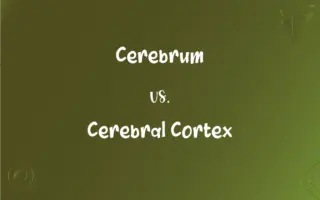Sure vs. Certain: What's the Difference?
Edited by Aimie Carlson || By Harlon Moss || Published on December 29, 2023
"Sure" implies confidence or agreement, often used informally; "certain" denotes firm conviction or inevitability, used in more formal contexts.

Key Differences
"Sure" is commonly used in casual conversation to express agreement or assurance. "Certain" is often used in formal or written contexts to denote a higher degree of confidence or to specify something definite.
"Sure" carries a friendly, informal tone. "Certain" implies a more serious, definitive tone, suggesting a higher level of confidence or knowledge.
"Sure" is often used as an adjective or adverb, and as a colloquial affirmative response. "Certain" is used primarily as an adjective to indicate definiteness or to specify particular things or people.
While "sure" can imply a sense of willingness or casual confirmation, "certain" denotes something that is known to be true or is inevitable.
"Sure" is versatile, suitable for everyday interactions. "Certain" is more suited for situations requiring clarity or formal assurance.
ADVERTISEMENT
Comparison Chart
Tone
Informal, conversational
Formal, definitive
Common Usage
Agreement, assurance
Conviction, specificity
Grammatical Role
Adjective, adverb; colloquial yes
Primarily adjective
Degree of Confidence
General assurance
High level of confidence
Example Sentences
"Sure, I'll help you."
"I am certain of the results."
ADVERTISEMENT
Sure and Certain Definitions
Sure
Signifies a high probability or likelihood.
It's sure to rain tomorrow.
Certain
Used to refer to specific or particular things.
There are certain rules you need to follow.
Sure
"Sure" indicates confidence or no doubt about something.
I'm sure we can finish the project on time.
Certain
"Certain" denotes something that is known to be true or inevitable.
I am certain that she will win the competition.
Sure
Used to express agreement or consent.
Sure, I'd love to join you for dinner.
Certain
Implies an absence of doubt.
He was certain of his decision.
Sure
In colloquial use, "sure" can serve as an informal affirmation.
Sure, that sounds like a good idea.
Certain
Often used to emphasize the reliability of information.
It is certain that the meeting will take place at noon.
Sure
Can imply readiness or willingness.
Sure, I can give you a hand with that.
Certain
Can be used to indicate inevitability.
It is certain that the sun will rise tomorrow.
Sure
Confident, as of something awaited or expected
I am sure we will win the game.
Certain
Definite; fixed
Set aside a certain sum each week.
Sure
Impossible to doubt or dispute; certain
We have sure proof of his innocence.
Certain
Sure to come or happen; inevitable
Certain success.
FAQs
Can "certain" be used to specify particular items?
Yes, "certain" can be used to specify particular things or people.
Can "sure" be used as an adverb?
Yes, "sure" can function as an adverb, as in "sure enough."
Is "sure" appropriate for formal writing?
"Sure" is less common in formal writing; "certain" is more appropriate.
Can "sure" and "certain" be used interchangeably?
While similar, they're not always interchangeable due to differences in formality and tone.
Is "sure" more casual than "certain"?
Yes, "sure" is typically more casual and conversational.
Does "certain" imply a higher degree of confidence?
Yes, "certain" typically implies a higher degree of confidence or inevitability.
Is "certain" used in legal or official documents?
Yes, "certain" is often used in formal, legal, or official contexts.
Is "certain" used to emphasize certainty in a statement?
Yes, "certain" is used to emphasize certainty or inevitability.
Is "sure" commonly used in everyday conversation?
Yes, "sure" is very common in casual, everyday conversation.
Can "certain" indicate a high probability?
"Certain" typically indicates something known or inevitable, rather than probability.
Can "sure" express willingness?
Yes, "sure" is often used to express willingness or readiness.
Is "sure" suitable for expressing agreement?
Yes, "sure" is often used to express agreement or consent.
Is "sure" used in questions?
Yes, "sure" can be used in questions, such as in "Are you sure?"
Does "certain" have a formal connotation?
Yes, "certain" generally has a more formal connotation.
Does "certain" always relate to future events?
No, "certain" can relate to any fact or situation that is known to be true.
Are there any phrases where "sure" and "certain" are used together?
Yes, in phrases like "sure and certain," both words are used for emphasis.
Can "certain" refer to an absence of doubt?
Yes, "certain" implies an absence of doubt about something.
Does "certain" convey a more serious tone?
Yes, "certain" generally conveys a more serious, formal tone.
Can "sure" be a response to a request?
Yes, "sure" is commonly used as an affirmative response to requests.
Is "sure" often used colloquially?
Yes, "sure" is frequently used in a colloquial manner.
About Author
Written by
Harlon MossHarlon is a seasoned quality moderator and accomplished content writer for Difference Wiki. An alumnus of the prestigious University of California, he earned his degree in Computer Science. Leveraging his academic background, Harlon brings a meticulous and informed perspective to his work, ensuring content accuracy and excellence.
Edited by
Aimie CarlsonAimie Carlson, holding a master's degree in English literature, is a fervent English language enthusiast. She lends her writing talents to Difference Wiki, a prominent website that specializes in comparisons, offering readers insightful analyses that both captivate and inform.






































































